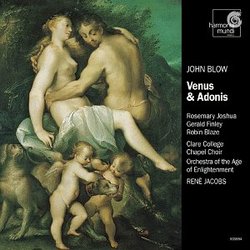In my opinion everybody should have a copy of this recording
07/13/1999
(4 out of 5 stars)
"The latest addition to the Harmonia Mundi Baroque collection is a splendid disk by the sadly under-performed English composer John Blow. Blow was ten years older than Purcell, who was not only his pupil and assistant organist, but also a friend with whom he exchanged early drafts of his scores and musical ideas. Venus and Adonis was written at the same time as the Purcell's, now more well-known, Dido and Aeneas; both works were written in response to King Charles II desire to imitate the music of the king of France, Louis XIV. In this recording, René Jacobs directs the Orchestra of the Age of Enlightenment led by, in my view, one of the best Baroque violin specialists today, Catherine Mackintosh. As is usual with this orchestra, the string sound in this recording is faultless throughout, with the two recorders and bassoon adding occasional colour in phrases and passages - such as the "Tune for Flutes" at the start of Act I. The title roles are sung by Rosemary Joshua and Gerald Finley respectively, and with their "Venus! Adonis!" routine at the beginning of Act I we are reminded how wonderfully affected the music of the English court was at this time. But Venus and Adonis do not appear until Act I which is almost eleven minutes into the fifty minute masque; before that, we hear the Prologue. The prologue, which does not exist in Purcell's Dido according to the informative programme notes, is dominated by Cupid who, in this recording is sung by counter-tenor Robin Blaze. The clarity, and rare musicality of Robin Blaze's performance are a delight to even the most unenlightened listener; note particular the remarkable "Cupid's Lesson" in act II, starring "Cupid and the little Cupids" - perhaps Blow's answer to seventeenth century "Spice Girls"? The story is simple and the music easily digestible, but then again, Charles's court was not known for its love of long stage works. There is no coupling on this disc, which runs for 51 minutes. If I had to fault this recording it would not be for the musicality which is consistent throughout, from performers to instrumentalists to the recording engineers; it would be for the lack of information about the performers. We know who they are, and what they look like because there are photos of them all on the back inside cover. Sadly this is a common ommission found in many Harmonia Mundi recordings because there appears to be an assumption that the recording will be bought only by the aficionados. In my opinion everybody should have a copy of this recording, not just the experts so come on Harmonia Mundi, tell us some more about your artists because they really do deserve it."
Outstanding orchestral playing
delia lesbos | Greece | 06/06/2000
(5 out of 5 stars)
"So often in an opera CD all people seem to listen for is the singers. What is extraordinary about this one is the amazing playing of the Orchestra of the Age of Enlightenment - without doubt the best period instrument orchestra in the world. Every aspect of their performance is perfection, wonderfully musical and gorgeous to listen to."
A voice teacher and early music fan
George Peabody | Planet Earth | 12/10/2006
(5 out of 5 stars)
"John Blow (1649-1708), in his official posts as organist, musician for the virginals, was also expected to supply a great quantity of church music, royal odes and secular choral music of an occasional character to celebrate events at court. Consequently, he wrote very little for the professional stage. A notable exception is his opera 'Venus and Adonis',which he called " A Masque for the Entertainment of the King".
The love story of Venus and Adonis, told by Ovid in Book 10 of the 'Metamorphoses',inspired a great many poets and artists of the Baroque period including Shakespeare. Blow's opera associates the theme of the hunt and its dangers to that of love and the wounds inflicted by Cupid's arrows. At the end of Act II of 'Venus and Adonis' the descending choromaticism of the ostinato ground with which the dance of the Graces concludes, darkens the mood after the playful arias of Cupid, and is like a premonition of the return of the mortally wounded Adonis and the grief of Venus. Blow's harmonic daring was disturbing to many listeners in that era, but not so to the 20th century ear that is more accustomed to hearing works that deviate drasticlly from the rules of strict harmony.
This little opera is really quite a 'gem' and contains some very entertaining scenes. Although the soloists were all of good quality, my interest was captured by the duets, trios and quartets scattered here and there thruout the opera. They were absolutely delightful to hear and very well sung. I especially enjoyed the chorus of the Hunstmen, Shepherds and Adonis. Robin Blaze as Cupid did not impress me at all; because the required voice range was really too high for him, his diction suffered greatly, and as many times as I have listened to this opera, I still have to follow a script when he sings. That, by the way, is not usual for him; his diction is quite good most of the time. The countertenor Christopher Josey (humtsman) was excellent; his voice was strong and clear. It's really quite an enjoyable opera, and Rene Jacobs (who I'm very glad is not singing anymore) pulls it together neatly and nicely."


 Track Listings (27) - Disc #1
Track Listings (27) - Disc #1